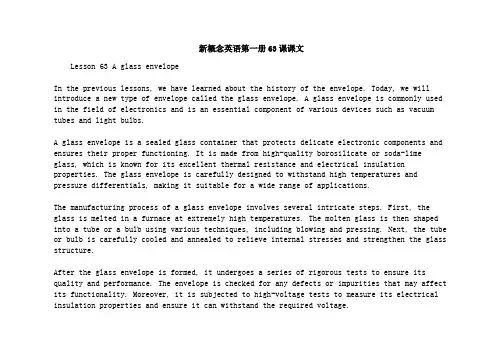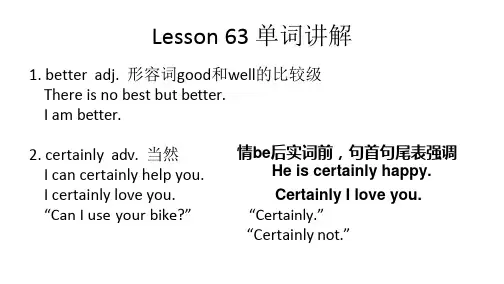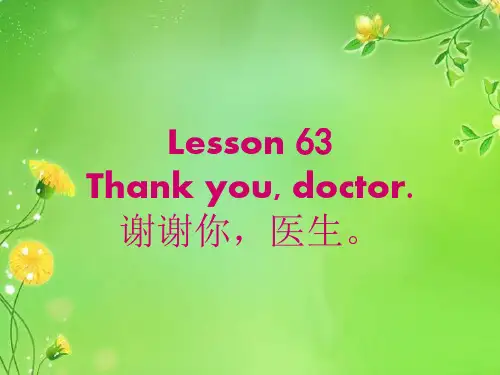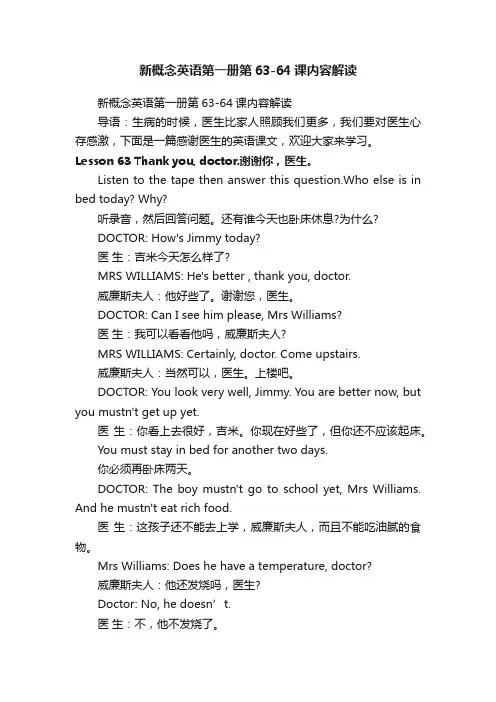NCE1 Lesson 63
- 格式:ppt
- 大小:1.59 MB
- 文档页数:18

新概念英语第一册63课课文Lesson 63 A glass envelopeIn the previous lessons, we have learned about the history of the envelope. Today, we will introduce a new type of envelope called the glass envelope. A glass envelope is commonly used in the field of electronics and is an essential component of various devices such as vacuum tubes and light bulbs.A glass envelope is a sealed glass container that protects delicate electronic components and ensures their proper functioning. It is made from high-quality borosilicate or soda-lime glass, which is known for its excellent thermal resistance and electrical insulation properties. The glass envelope is carefully designed to withstand high temperatures and pressure differentials, making it suitable for a wide range of applications.The manufacturing process of a glass envelope involves several intricate steps. First, the glass is melted in a furnace at extremely high temperatures. The molten glass is then shaped into a tube or a bulb using various techniques, including blowing and pressing. Next, the tube or bulb is carefully cooled and annealed to relieve internal stresses and strengthen the glass structure.After the glass envelope is formed, it undergoes a series of rigorous tests to ensure its quality and performance. The envelope is checked for any defects or impurities that may affect its functionality. Moreover, it is subjected to high-voltage tests to measure its electrical insulation properties and ensure it can withstand the required voltage.Once the glass envelope passes all the tests, it is ready to be used in electronic devices. Vacuum tubes, for example, rely on glass envelopes to maintain a vacuum inside, which is crucial for their operation. Light bulbs also utilize glass envelopes to protect the filament and provide a controlled environment for the emission of light.In conclusion, the glass envelope is an important component in the field of electronics. Its ability to withstand high temperatures and pressure differentials, along with its excellent electrical insulation properties, make it an ideal choice for various electronic devices. Without the glass envelope, many of the devices we use today would not be possible.。

Lesson 63 单词讲解1.better adj. 形容词good和well的比较级There is no best but better.I am better.2.certainly adv. 当然I can certainly help you.I certainly love you. 情be后实词前,句首句尾表强调He is certainly happy.Certainly I love you.“Can I use your bike?”“Certainly.”“Certainly not.”3.get up 起床go to bed / go to sleep4.yet adv. 还,仍5.rich adj. 油腻的6.food n. 食物rich food fast food seafood green food 7.remain v. 保持,继续Lesson 63 课文讲解How are you?How is he?How is she?How is the weather?He is better.can 1 能力 2 允许(征求对方的意见) 3 请求,要求upstairs adv. 楼上downstairs adv. 楼下go upstairs 上楼go downstairs adv. 下楼come upstairs come downstairsfor + 时间表示一段时间for three yearsfor twenty yearsfor everanother + 可数名词单数Here is another photograph. another + 数词+ 名词(可以是复数) I need another two hammers.What about the dog?about prep. 关于I am sorry about that.大约There are about ten boys in the room. each day VS every dayevery 强调整体every day 每天Their father takes them to school every day.each 强调个体each day 每一天(中)You must take the medicine three times each day. Jimmy gives Mr. Williams his cold.Lesson 63 语法讲解have (has)1.拥有have an umbrella have a bike have some water 2.吃,喝have an apple have a biscuit have some coffee 3.患生得长有如遇到h 视a 频v 无e 法正f 常lu 播放,课件错误,知h 识a 点v 错e 误等m 课程e 问a 题s ,le 可以s 添加服务QQ31h 70a 32v 2e 794m 进行u 解m 决,p 学s 习问题请到知识堂: http:/have (has) 4.have +aLesson 63 语法讲解名词(动作、行为)从事、进行……have a bath / a rest / a talk / a swim / a walk / a try 5.经历have a holiday have a party have a class1.play v. 玩Lesson 64 单词句型讲解They are playing in the garden.play with ……play with a ball / doll / toy2.match n. 火柴3.talk v. 谈话talk bigmatchesHe always talks big.4.library n. 图书馆5.drive v. 开车drive somebody to somewhereI can drive you to the airport.6.so adv. 如此地so happy so easy so nice 7.quickly adv. 快地Quickly! Hurry up!8.lean out of 身体探出lean /li:n/ v. 倾斜,倚靠Don’t lean out of the window! 9.break v. 打破break a glass / a vase / a window break the fast = breakfast10.noise n. 喧闹声make a noise动词原型walk walks walking情态动词+ 动词原型He must stays at home.She can help us.He must stay at home.be going to + 动词原型I am going to do my homework.祈使句中的动词用原型Don’t + 动词原型Be careful! Don’t drop it!She often get up early.如遇到S视h频e无法o正f常t播e放n,g课件e错ts误,u知p识点e错a误r等l课y程p:/Lesson 63&64 知识拓展(学生版)1.—What does Linda often do in the evening?—She often her homework.A doB didC doneD does2.Bob is ill. He must a doctor.A seesB seeingC seeD saw3.Let me .A have tryB have a tryC do tryD do a try4.—What would you like to drink?—I would like to have .A some teaB any teaC an teaD a tea。





新概念英语第一册第63-64课内容解读新概念英语第一册第63-64课内容解读导语:生病的时候,医生比家人照顾我们更多,我们要对医生心存感激,下面是一篇感谢医生的英语课文,欢迎大家来学习。
Lesson 63 Thank you, doctor.谢谢你,医生。
Listen to the tape then answer this question.Who else is in bed today? Why?听录音,然后回答问题。
还有谁今天也卧床休息?为什么?DOCTOR: How's Jimmy today?医生:吉米今天怎么样了?MRS WILLIAMS: He's better , thank you, doctor.威廉斯夫人:他好些了。
谢谢您,医生。
DOCTOR: Can I see him please, Mrs Williams?医生:我可以看看他吗,威廉斯夫人?MRS WILLIAMS: Certainly, doctor. Come upstairs.威廉斯夫人:当然可以,医生。
上楼吧。
DOCTOR: You look very well, Jimmy. You are better now, but you mustn't get up yet.医生:你看上去很好,吉米。
你现在好些了,但你还不应该起床。
You must stay in bed for another two days.你必须再卧床两天。
DOCTOR: The boy mustn't go to school yet, Mrs Williams. And he mustn't eat rich food.医生:这孩子还不能去上学,威廉斯夫人,而且不能吃油腻的食物。
Mrs Williams: Does he have a temperature, doctor?威廉斯夫人:他还发烧吗,医生?Doctor: No, he doesn’t.医生:不,他不发烧了。




Lesson 63-64Wordsdoctor better certainly well mustn’t temperature hour cool-warm-hot have-has noise match break quickly library talk drive yet aboutPhraseswho else come upstairs get up for about two hours each day remain in bed for another two days keep the room warmgo to school rich food have a temperature make a noiseplay with matches talk in the library drive so quicklylean out of the window break the vase take the medicineSentences1.How’s Jimmy today? -Better. Thank you, doctor.2.You are better now, but you mustn’t get up yet.3.You must stay in bed for another two days.4.The boy mustn’t go to school yet and he mustn’t eat rich food.5.Does he have a temperature? -No, he doesn’t.6.Must he stay in bed? -Yes. He must remain in bed for another two days.7.He can get up for about two hours each day, but you must keep the room warm.8.Don’t lean out of the window. You mustn’t lean out of the window.GrammarA.mustn’tmust not的缩写,表示“禁止”,“不准”,与Don‘t do…,意思相近。
新概念第一册教案63-64课教案(2)保存;保留:He would not be able to keep his job. 他恐怕保不住他那份工作了。
If you like it, just keep it. 你如果喜欢的话,那把它留下来吧。
(3)保守;储藏:Please keep this secret. 请保守这一秘密。
Would you keep my things for me while I'm away? 在我离开的这段时间里,你能为我保管一下东西吗?2.Remain v.(1)留下;停留:You'd better remain at home. 你最好留在家里。
We're going to remain in Rome for another two days. 我们准备再在罗马逗留两天。
(2)保持不变:It will remain cold for a couple of days. 天气还将持续冷几天。
Most people remained silent at the meeting. 多数人在会上保持沉默。
Teaching procedures.Step1. Greeting and warm up.Introduce the storyStep2. Review. 检查课文背诵相关作业的口头提问Step3. Presentation.Understand the situation Ask the students to interpret the pictures.T:Listen to the story and see if you can answer this question:Does it ever snow in Greece?Play the tape or read the dialoguePlay the tape or read the dialogue again, pausing after every line tocheck the students understand.Play the tape or read the dialogue again, pausing after every line,and ask the students to repeat(a) in chorus,(b) in small groups,(c) individually.Reading aloudAsk one or two students to take parts and to read the dialogue aloud.Step4. Practice.Step5. Summary. Asking questionsStep6. Homework.Reflection. 1.advantage2.disadvantageBoard design。